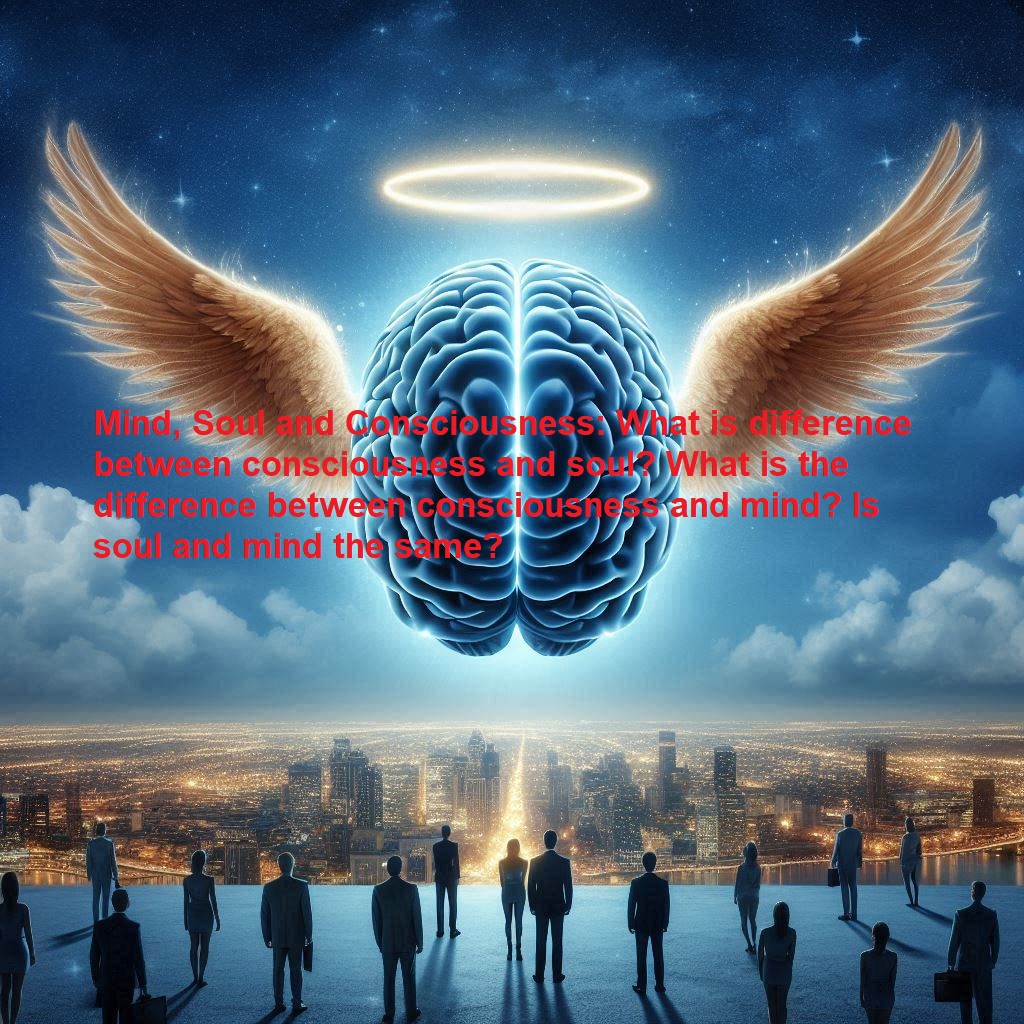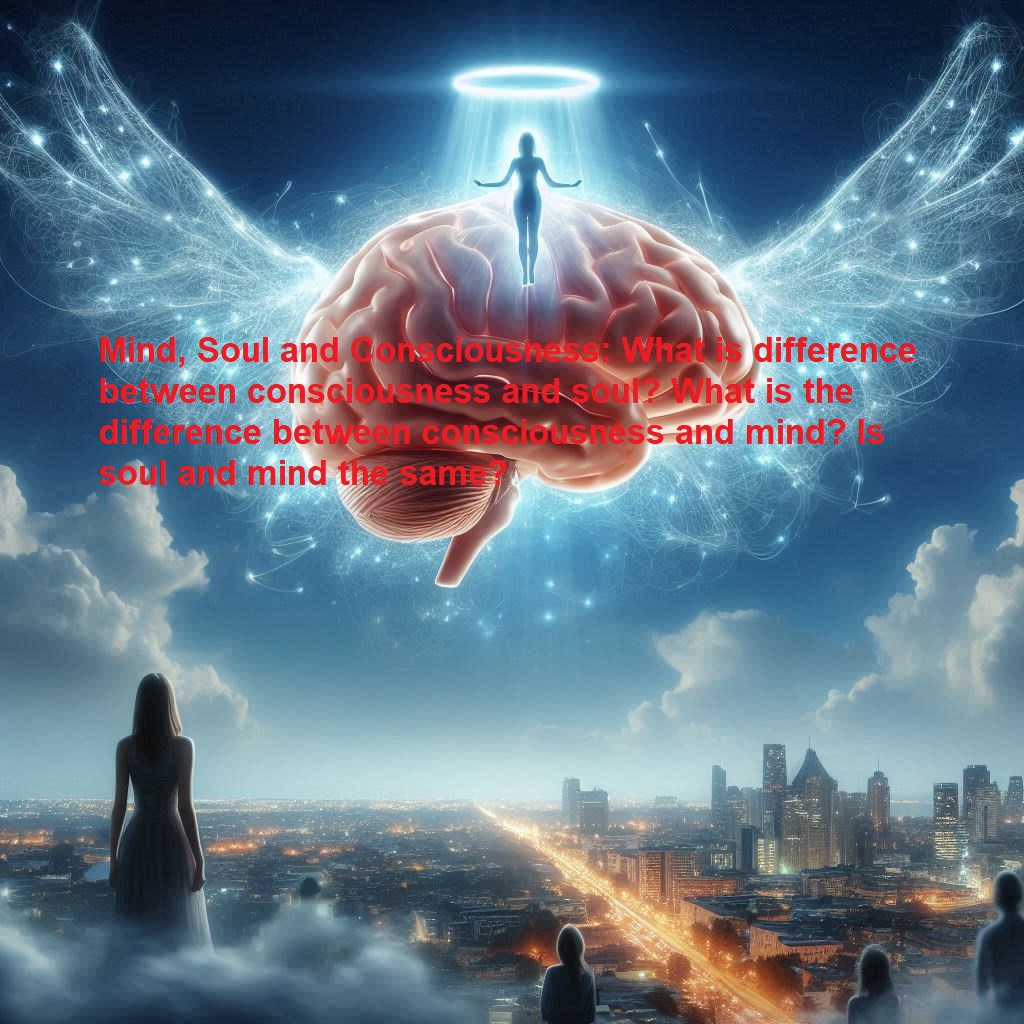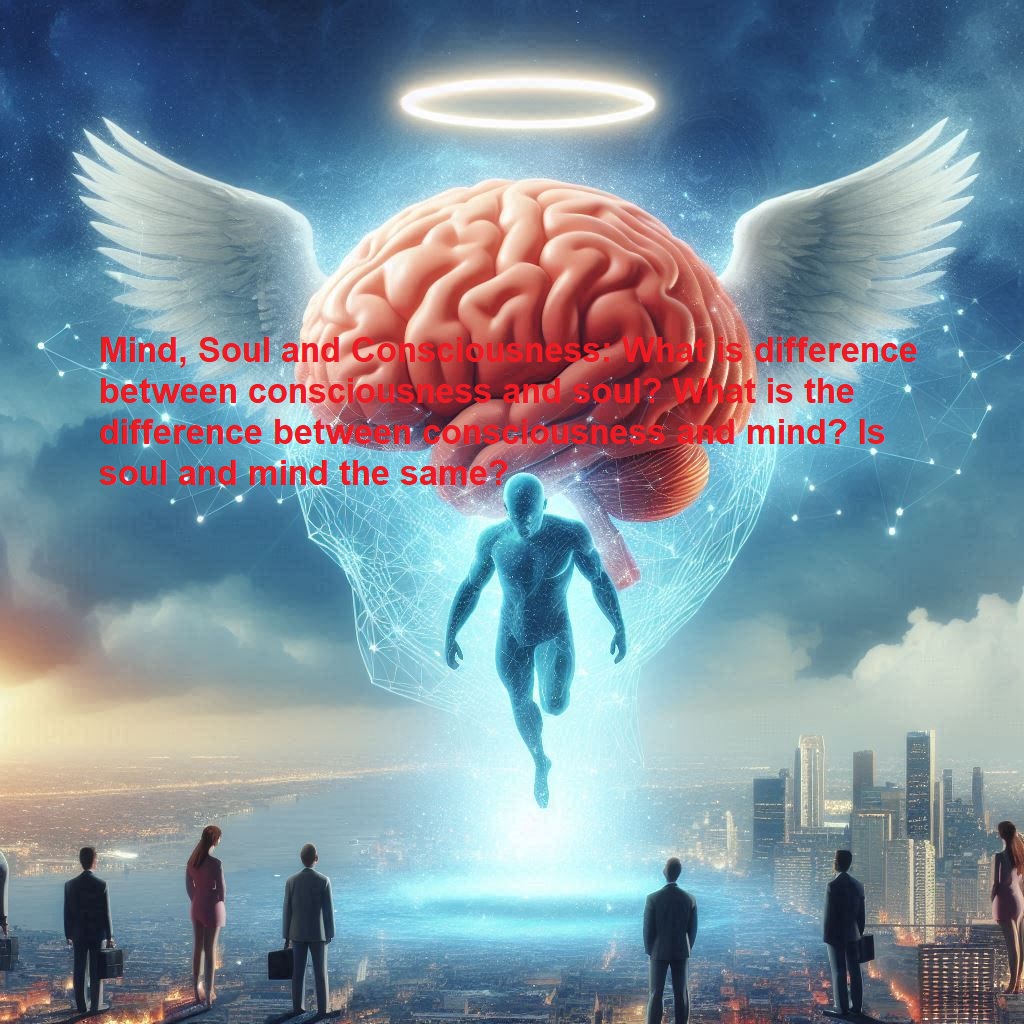Mind, Soul and Consciousness: What is difference between consciousness and soul? What is the difference between consciousness and mind? Is soul and mind the same?
Mind, soul, and consciousness are interconnected yet distinct concepts that have been pondered and debated for centuries across various philosophical, religious, and scientific traditions.
- Mind: The mind typically refers to the aspects of intellect and cognition, encompassing thoughts, perceptions, emotions, memories, and the ability to reason. It’s often associated with brain functions and activities, but it extends beyond mere neurological processes. In many philosophical traditions, the mind is seen as the seat of consciousness and the bridge between the physical and non-physical realms.
- Soul: The concept of the soul varies greatly across different belief systems. Generally, it’s considered the essence of a person, the spiritual or immaterial aspect that transcends the physical body and is often associated with concepts like identity, morality, and personal continuity beyond physical death. Religions such as Christianity, Islam, Hinduism, and Buddhism all have their own interpretations of the soul, ranging from immortal and individual to interconnected and impermanent.
- Consciousness: Consciousness is the state or quality of awareness, of being aware of an external object or something within oneself. It includes the ability to experience sensations, thoughts, and feelings. Consciousness is often described as the most mysterious aspect of the mind, as it raises questions about the nature of subjective experience and the relationship between the physical brain and mental phenomena. While it’s closely related to brain activity, many aspects of consciousness remain poorly understood, leading to various theories and philosophical inquiries.
These concepts intersect in complex ways, and different perspectives may emphasize one aspect over another. Some see consciousness as emerging from the mind, which in turn is influenced by the soul or spiritual dimension. Others may view consciousness as a fundamental aspect of existence, with the mind and soul being expressions or manifestations of this deeper reality. Ultimately, the understanding of mind, soul, and consciousness often reflects broader philosophical, religious, and scientific frameworks within which individuals interpret their experiences and perceptions of reality.
These three terms are intricately linked but hold distinct meanings. Here’s a breakdown:
- Mind is the intellectual faculty of a person; the ability to reason, process information, think, and problem-solve. It’s associated with thoughts, memories, emotions, and perceptions. Neuroscientists believe the mind is a product of the brain’s complex network of neurons.pen_spark
- Consciousness is the state of being aware of and responsive to one’s surroundings. It’s the ability to experience feelings, sensations, thoughts, memories, and the environment. While closely linked to the mind, consciousness is a broader concept.
- Soul is a concept in many religions and philosophies that refers to the immaterial essence or animating force of a living person. It’s often believed to be the part of a person that survives after death.
The mind and consciousness are scientific concepts that can be studied and explained through psychology and neuroscience. The soul, on the other hand, is a spiritual concept that cannot be proven scientifically.
The relationship between mind, soul, and consciousness has been pondered by humans for centuries, with different cultures, religions, and philosophical traditions offering their own unique perspectives.
In Western philosophy, the mind is often seen as the seat of consciousness, the faculty that enables us to think, feel, perceive, and be aware of ourselves and the world around us. The soul, on the other hand, is a more controversial concept, with some philosophers viewing it as the spiritual or immaterial aspect of a person that survives death, while others argue that there is no such thing as a soul, and that consciousness is simply a product of the physical brain.
In Eastern philosophies, such as Hinduism and Buddhism, the concept of Atman or Brahman is often equated with the soul or the ultimate reality, and the goal of spiritual practice is to transcend the limitations of the individual ego and realize one’s true nature as part of this universal consciousness.
Mind, Soul and Consciousness: What is difference between consciousness and soul? What is the difference between consciousness and mind? Is soul and mind the same?
You’ve raised some thought-provoking questions about the nature of consciousness, soul, and mind. While these concepts are still subject to philosophical debate, here’s a general overview of how they’re often understood:
Consciousness refers to our awareness of ourselves and the world around us, our ability to think, feel, perceive, and experience. It’s often seen as the “inner voice” that observes our thoughts, emotions, and sensations. Some argue that consciousness is a fundamental aspect of reality, while others believe it’s a product of brain activity.
Soul, on the other hand, is a more controversial concept, often associated with spirituality or religion. It’s generally viewed as the immaterial or spiritual aspect of a person, the part that survives physical death and may be subject to eternal reward or punishment. Some believe that the soul is the source of consciousness, while others argue that the concept of a soul is not necessary to explain consciousness or mind.
Mind is often used as an umbrella term to refer to our mental faculties, including consciousness, perception, memory, thinking, reasoning, and imagination. In this sense, the mind is not a physical entity but rather a collection of mental processes that arise from the brain’s activity. However, some argue that the mind is not reducible to brain activity alone, and that there may be aspects of the mind that transcend physical explanation.
So, to summarize, consciousness is our awareness of ourselves and the world, the soul is the spiritual aspect of a person that may or may not be connected to consciousness, and the mind encompasses both consciousness and other mental processes. While there’s no universal agreement on the relationship between these concepts, they continue to be a source of fascination and philosophical inquiry.
Distinguishing between consciousness, soul, and mind can be a nuanced task due to the overlap and interconnectedness of these concepts. However, there are subtle differences that help clarify their distinct roles:
- Consciousness vs. Soul:
- Consciousness: Consciousness refers to the state or quality of awareness, the ability to experience sensations, thoughts, and feelings. It’s the subjective aspect of experience, the “what it’s like” to be aware. Consciousness is often considered a fundamental aspect of living beings, allowing them to interact with and perceive the world around them.
- Soul: The concept of the soul is often tied to notions of spirituality, identity, and personal continuity beyond physical death. It’s seen as the essence of a person, the immaterial or spiritual aspect that transcends the physical body. While consciousness is a feature of living organisms, the soul is often thought to persist beyond physical life, carrying with it the individual’s essence or identity.
- Consciousness vs. Mind:
- Consciousness: As mentioned earlier, consciousness is the state or quality of being aware, of having subjective experiences. It includes awareness of external stimuli as well as internal mental processes such as thoughts, emotions, and perceptions.
- Mind: The mind encompasses a broader range of mental activities, including thoughts, emotions, memories, perceptions, reasoning, and more. While consciousness is a component of the mind (as the mind is aware of its own experiences), the mind also includes subconscious and unconscious processes that may not always be directly accessible to conscious awareness.
- Soul and Mind:
- Soul and Mind Relationship: The relationship between the soul and the mind varies depending on philosophical, religious, and cultural perspectives. Some views consider the soul and mind to be closely intertwined or even synonymous, both representing the non-physical aspects of a person’s being. In this interpretation, the mind is the expression of the soul’s activities, encompassing thoughts, emotions, and consciousness itself. However, other perspectives may distinguish between the soul, which represents the deeper, eternal essence of a person, and the mind, which reflects the dynamic interplay of mental processes.
In summary, while consciousness, soul, and mind are interconnected aspects of human experience, they have distinct characteristics and functions. Consciousness pertains to awareness and subjective experience, the soul relates to spirituality, identity, and continuity beyond physical existence, and the mind encompasses a broader range of mental activities including conscious and unconscious processes. The relationship between these concepts can vary depending on cultural, religious, and philosophical perspectives.
Here’s a deeper dive into the differences between consciousness, mind, and soul:
Consciousness vs. Soul
- Focus: Consciousness is about awareness and experience in the present moment. It’s the “what” of experience – you feeling the warmth of the sun or the taste of your favorite food. The soul, on the other hand, focuses on the “who” – your essence, your being, and the potential for continuity beyond physical existence.
- Scientific basis: Consciousness is a scientific concept. Neuroscientists are actively researching the neurological basis of consciousness, studying how the brain generates subjective experiences. The soul, however, lacks a scientific explanation. It’s a belief system based on faith and tradition.
- Death: The concept of consciousness is generally tied to the living brain. When we lose consciousness (like during sleep or anesthesia), it’s because our brains are in a different state. The soul, in contrast, is often seen as persisting after death.
Consciousness vs. Mind
- Scope: Consciousness is a broader concept. It encompasses everything you are aware of, both internal (thoughts, feelings) and external (sensory experiences). The mind is a bit narrower, focusing on your mental processes like thinking, reasoning, remembering, and imagining.
- Levels: Consciousness can fluctuate. We can be more or less conscious depending on our brain state (awake, asleep, dreaming) or the use of substances. The mind, however, is generally considered a constant entity, although its functioning can be altered by those same factors.
- Example: Imagine watching a movie. Your consciousness allows you to experience the sights, sounds, and emotions of the film. Your mind interprets these experiences, allowing you to understand the plot, recognize characters, and form your own opinions about the film.
Mind vs. Soul
- Material vs. Immaterial: The mind is a product of the physical brain. It’s a complex network of neurons firing and processing information. The soul, on the other hand, is immaterial – existing beyond the physical realm.
- Function: The mind is responsible for our thoughts, feelings, memories, and perceptions. It allows us to navigate the world and interact with others. The soul, in various belief systems, is linked to our sense of self, purpose, and morality.
While these terms are interconnected, they represent distinct aspects of our existence. Consciousness is the raw experience of being aware. The mind is the machinery that creates those experiences. The soul is a spiritual concept related to our essence and potentially something beyond our physical form.





You must be logged in to post a comment.